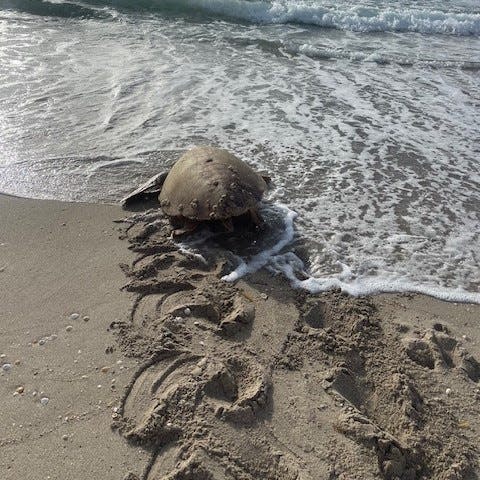Sea turtle monitors rescue 300-pound loggerhead that got stuck between rocks in Palm Beach
It was no routine stroll down a town beach Monday for a fully grown loggerhead sea turtle.
The 300-pound female wedged itself between a semi-exposed cluster of rocks near the Palm Beach Country Club on North Ocean Boulevard, prompting an immediate — and successful — response from the town's sea turtle monitor, D.B. Ecological Services.
Representatives of the company, which is contracted by Palm Beach to monitor sea turtle nesting, freed and released the turtle after determining she was in good health, Christine Perretta, the firm's president, told the Daily News.
Perretta said she routinely coordinates with the Florida Fish and Wildlife Conservation Commission to determine whether it's appropriate to release an animal or take it to a rehab facility to be checked out.
"This one was deemed to be releasable," she said. "She was full of spit and vinegar, and she was definitely happy to get un-wedged and sent on her way."
The turtle, which did not nest during her crawl along the beach, was discovered by a D.B. Ecological Services staff member Monday during a routine morning survey, Perretta said. The staff member notified Perretta, who sent out additional staff to help free the turtle.
Related: Why do some female sea turtles fail to lay eggs? Here are six reasons for 'false crawls'
"She was coming back down the beach, and there were some rocks exposed on the beach, not fully exposed, but kind of halfway," Perretta said of the turtle. "She was kind of making her way back to the beach, and she somehow got a little cattywampus and got sideways and then hung up."

It took her staff about 10 minutes to free the turtle and send her on her way, Perretta said.
A video taken by Dragana Connaughton, a Palm Beach resident and photographer, shows D.B. Ecological Services staff working to dislodge the turtle and free her.
"It's exciting to see the footage," Perretta said. "You can see the effort it takes to do this work, and how excited we are about it every day. My crew does a high-five and cheers once they free her. We have that same excitement and joy every day that we do this work."
The turtle was one of a half-dozen that D.B. Ecological Services staff members have rescued this summer, and the first to be caught in rocks, Perretta said. Several of the turtles were hung up on "walkovers," which are the stairs that allow people access to the beach, she said. They are typically made of wood.
Sea turtles often get caught underneath the walkovers or stuck in the gap between the hand railing and the posts nearest the sand, Perretta said, though new guidance issued by the state's Department of Environmental Protection could help eliminate those concerns in the future.
A permit from DEP is required for construction of walkovers on most sandy beaches fronting on the open waters of the Atlantic Ocean or Gulf of Mexico, according to the agency's website.
"If you picture the hand railing coming down the beach along the stairs of a walkover, the distance is usually wide enough where a sea turtle can get between those two downward posts, and they get stuck in those," Perretta said. "DEP has issued some additional guidance to make that gap smaller, so hopefully that will prevent this from happening in the future as walkovers are changed and new construction happens."
The state is in the middle of sea turtle nesting season, which runs from March 1 through Oct. 31.
Palm Beach requires all oceanfront properties to shut off artificial lights during that time to protect sea turtles and hatchlings. Artificial lighting can confuse turtles and hatchlings and lead them away from the ocean instead of toward it, the town said.
Nesting sea turtles can be reported to the Florida Fish and Wildlife Conservation Commission at 888-404-3922.
Jodie Wagner is a journalist at the Palm Beach Daily News, part of the USA TODAY Florida Network. You can reach her at jwagner@pbdailynews.com. Help support our journalism. Subscribe today.
This article originally appeared on Palm Beach Daily News: Loggerhead turtle freed on Palm Beach after getting wedged in rocks
